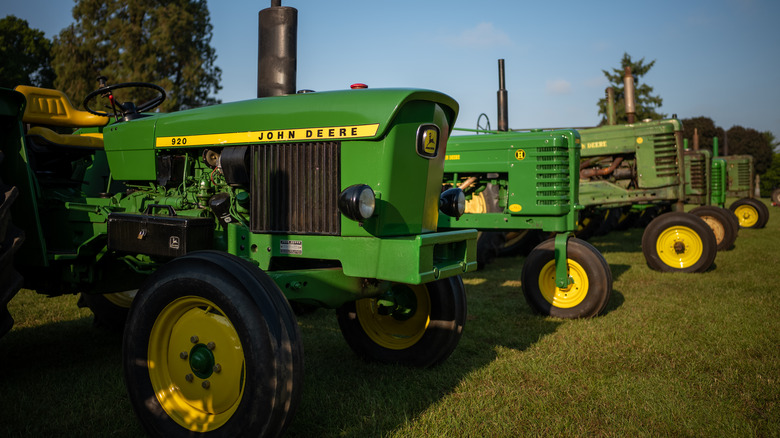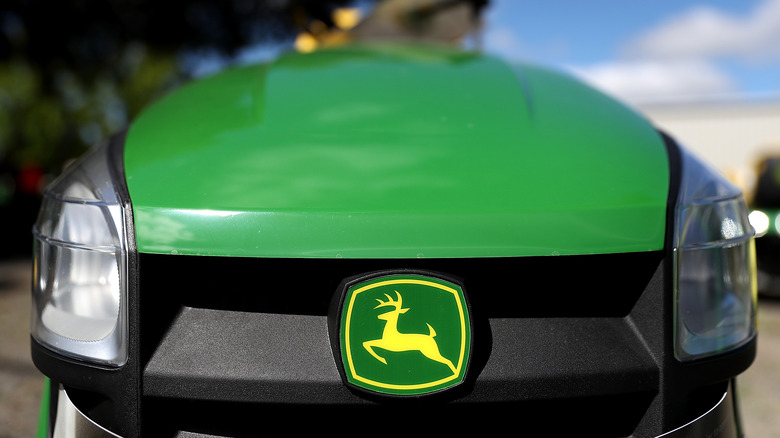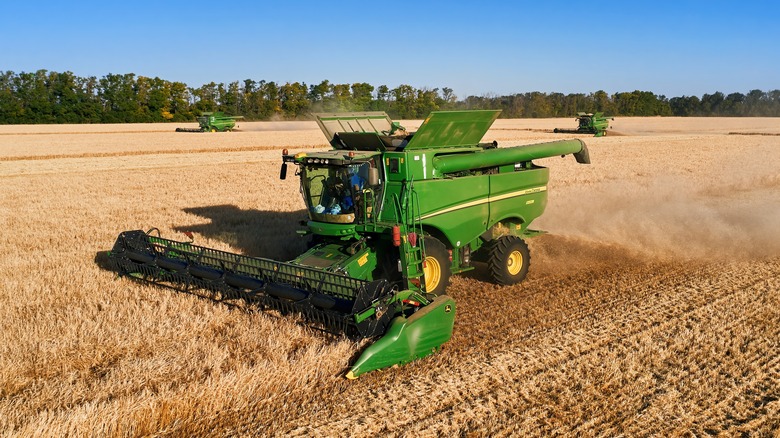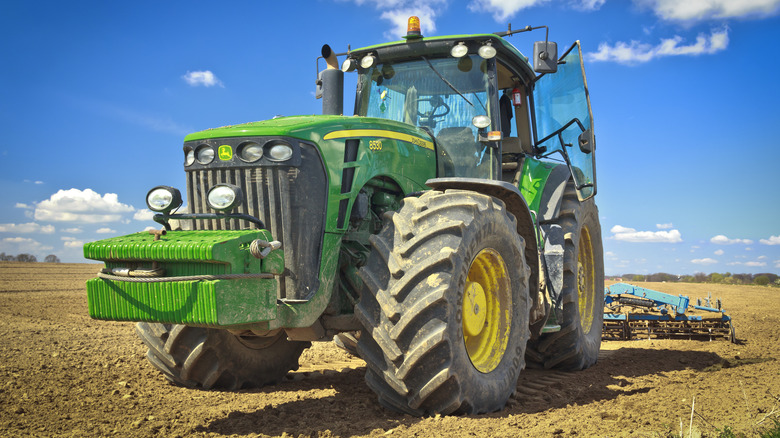Is John Deere Building More Electric Tractors? Here's What We Know
For many, John Deere is the definitive tractor and lawn mower brand, and has been for decades. The image of a green piece of equipment emblazoned with that signature yellow deer logo is synonymous with farming, landscaping, and general outdoor work in the eyes of countless folks. Sure, the John Deere who was the man behind the world's most famous tractors may not be well-known, but his company and its products are. This isn't an accident, either, as those at John Deere have worked hard to keep the brand at the cultural and technological forefront.
John Deere takes its products and customers seriously, constantly seeking to innovate for whatever challenges might arise next. For example, a hot topic today is the use of fossil fuels and a switch to less environmentally damaging forms of energy, including some pretty strange renewable energy sources. And many tech companies have embraced electric options instead of going full-speed ahead with gasoline.
Besides some recent hybrids and electric models, John Deere's tractors have run on gas and diesel throughout its existence, but could we be on the precipice of a big change for the almost-two-centuries-old brand? Are John Deere tractors going electric? Here's what we know so far.
John Deere has big electric plans for the future
Even though John Deere's legacy is built on combustion-engine technology, the company has announced big electric plans. The public can expect a whole line of electric John Deere agricultural and landscaping equipment to arrive by 2026, bringing with it easier maintenance, quieter operation, and fewer carbon-dioxide emissions.
Per John Deere, its new fully electric line will include compact utility tractors, commercial and residential mowers, Gator utility vehicles, and over 20 kinds of construction equipment. According to Derek Muller, product manager for electrification, these innovations are being made with the company's customers in mind.
"We've started this journey to solve customer pain points and deliver value," he said, adding that the company hopes to cut costs to the consumer while still delivering quality equipment that's user-friendly. At the same time, don't expect everything John Deere currently makes to have an electric equivalent in the near future.
It's not likely everything John Deere will go electric
The idea of tractors, mowers, and more going electric might not sound that appealing to some. Farm equipment isn't cheap, after all, so getting rid of everything and having to start fresh with new stuff that may not work as efficiently or for as long could be problematic. But John Deere has made it clear that it has no intention of forcing users into electric equipment, nor does it expect to make an electric version of every piece at this point. Simply put, it's just not practical now to take especially larger pieces of John Deere equipment and convert them to electric.
"I talked about the 8R tractors. When I ran the numbers on it, if you power that with a lithium-ion battery today, it's twice the volume, twice the weight, twice the mass, and four times the cost," Jahmy Hindman, John Deere's chief technical officer, said during a chat with Farm Journal. "That just doesn't pencil."
Instead, he mentioned that investing in cleaner energy sources such as renewable diesel is John Deere's focus for these machines. Hindman added, though, that such energy sources are in short supply at reasonable prices, which is why more efforts haven't been made to push for them.
John Deere is looking into autonomous equipment, too
In working on electric vehicles and looking into generally greener sources of energy, John Deere has dipped its toe into other technological pools as well. That includes the debatably sentient tech known as artificial intelligence, which John Deere is looking into for purposes including aiding in the identification and removal of weeds from fields without also targeting crops.
In a similar vein, the tractor giant is working on autonomous farming equipment to get all kinds of work done. In the same interview with Farm Journal, Hindman said that within the next decade the company plans to make fully automated farm production possible. "Our goal is by 2030, in certain production systems, to be able to have, if a grower chooses to, a fully autonomous production system," he said. "All the way through spring tillage and planting, all the way through harvest at the end."
He clarified that this initiative will be taken one step and one piece of equipment at a time, and that it isn't being done to completely remove humans from the farming process. Hindman said he sees the emotional and personal value of getting such work done by hand, so John Deere doesn't seek to eliminate that human touch.



